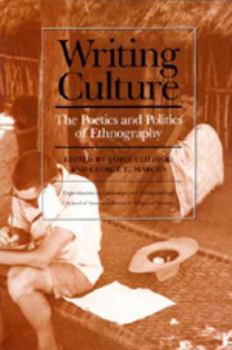Writing Culture: The Poetics and Politics of Ethnography
Select Format
Select Condition 
Book Overview
In these new essays, a group of experienced ethnographers, a literary critic, and a historian of anthropology, all known for advanced analytic work on ethnographic writing, place ethnography at the center of a new intersection of social history, interpretive anthropology, travel writing, discourse theory, and textual criticism.
The authors analyze classic examples of cultural description, from Goethe and Catlin to Malinowski, Evans-Pritchard, and Le Roy Ladurie, showing the persistence of allegorial patterns and rhetorical tropes. They assess recent experimental trends and explore the functions of orality, ethnicity, and power in ethnographic composition.
Writing Culture argues that ethnography is in the midst of a political and epistemological crisis: Western writers no longer portray non-Western peoples with unchallenged authority; the process of cultural representation is now inescapably contingent, historical, and contestable. The essays in this volume help us imagine a fully dialectical ethnography acting powerfully in the postmodern world system. They challenge all writers in the humanities and social sciences to rethink the poetics and politics of cultural invention.
The authors analyze classic examples of cultural description, from Goethe and Catlin to Malinowski, Evans-Pritchard, and Le Roy Ladurie, showing the persistence of allegorial patterns and rhetorical tropes. They assess recent experimental trends and explore the functions of orality, ethnicity, and power in ethnographic composition.
Writing Culture argues that ethnography is in the midst of a political and epistemological crisis: Western writers no longer portray non-Western peoples with unchallenged authority; the process of cultural representation is now inescapably contingent, historical, and contestable. The essays in this volume help us imagine a fully dialectical ethnography acting powerfully in the postmodern world system. They challenge all writers in the humanities and social sciences to rethink the poetics and politics of cultural invention.
Format:Paperback
Language:English
ISBN:0520057295
ISBN13:9780520057296
Release Date:April 1986
Publisher:University of California Press
Length:345 Pages
Weight:0.96 lbs.
Dimensions:9.0" x 0.8" x 6.0"
Related Subjects
Cultural Education & Reference Politics & Social Sciences Social Science Social SciencesCustomer Reviews
2 ratings
Scholarship, Culture, Poetics and Politics: shared concerns
Published by Thriftbooks.com User , 22 years ago
This collection constitutes another solid, suggestive and significant contribution to what is now one of the most dynamic arenas in the humanities and outside: Culture. The essays speak to all manner of representational practices and explore vital questions that no scholar interested in social dynamics of any kind can afford to ignore.
A Must For All Ethnographers
Published by Thriftbooks.com User , 24 years ago
As the title says, not only do ethnographers objectively research and write "about" cultures, in the process, they are also "writing Culture": that is, we constitute the cultural realities even as we attempt to describe them. Language is not a transparent window through which we describe an already existing reality. language "is the maker of this world" says Fisher. Understanding this, the ethnographer is confronted with writing and its importance in the ethnographic description and analysis of cultural worlds. Self-reflexivity in writing ethnography is central to the text. Who has the authority to write Others into being? How does my position as a gendered, racial, and class subject affect my "writing-up" of culture? These are just some of the questions posed by this text, with the added bonus of some possible answers as well. A must read for anyone on the verge of conducting ethnographic research. Also a great text for qualitative research courses concerned with issues of postmodernity and postcolonialism.





